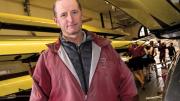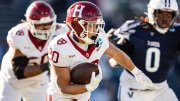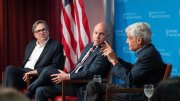Yale was determined. They were heartily sick of Harvard’s ownership of the annual Harvard-Yale crew race, where the Bulldogs’ only win this century came in 2007. Indeed, the late Harry Parker, arguably the greatest rowing coach of all time, amassed a lopsided 44-7 record over Yale in the ancient boat race during his Harvard career, which began in 1963.
The Elis took countermeasures. In 2010 they hired one of the nation’s premier crew coaches, Steve Gladstone, who, at 68, was extraordinarily well seasoned for a new hire. In 2012, Yale College abolished freshman crew (a program dating back to at least 1893; Harvard’s freshman program continues), allowing Gladstone to bring fresh recruits straight into his varsity eight.
By last spring, the Elis were feeling their oats. Their undefeated varsity marched into the climactic Eastern Sprints regatta in May as the number-one seed. Alas, Yale finished a deflating sixth in the final. Harvard won. Three weeks later, at New London, Harvard recorded its seventh straight sweep of Yale, annihilating a skilled, highly motivated Eli varsity by more than three boat lengths. Excepting the Intercollegiate Rowing Association national championships, where the University of Washington earned its fourth consecutive title, Harvard went undefeated last spring.
As discouraging as such results must have been for the Bulldogs, they were equally heartening to the Crimson faithful, as a new coach led the Harvard heavyweights for the first time in half a century. Charley Butt, chief of the Crimson men’s lightweights since 1985, became Bolles-Parker head coach for Harvard men’s heavyweight crew after Parker died in the summer of 2013. His job was to fill the biggest shoes in college rowing—and he has, admirably. “It’s wonderful that we could accomplish what we have this year, just for all the obvious reasons,” he told The Boston Globe after the Yale race. “We moved on as we began, following the tenets that H. Parker established, and it’s been a real pleasure.”
Though Butt’s appointment was not automatic, he was for many reasons the logical choice, having worked alongside Parker for a quarter-century and having built a record of success nearly as impressive. In his 28 years at the helm, Butt’s lightweights logged 25 winning seasons, 15 Eastern Sprints titles, and nine national championships, monopolizing both the latter honors in 2012 and 2013. Decades in Newell Boathouse mean that Butt “knows the Harvard culture,” says John Powers ’70, the Boston Globe sportswriter whose chapter on lightweight rowing appears in the recently published Third H Book of Harvard Athletics: 1963-2013. “He knows the kind of people you are dealing with, and what motivates them. Like Harry, Charley has a gift for explaining to a rower, ‘You’re doing this, which makes you do that.’ Harvard athletes want to know why—they want ‘news that stays news,’ the eternal essentials of moving a boat.”
Furthermore, Butt owns an impressive track record in international competition. He coached single scullers Andrew Campbell ’14 (to a gold medal in world competition) and Michelle Guerette ’02 (to a silver medal at the 2008 Olympics). About Guerette’s win, Powers recalls, “Charley’s race plan in Beijing was brilliant, and absolutely on the money. He knew all six women in that final, and told Michelle, ‘Row your race, and the field will come back to you.’ And that’s exactly what happened [late in the race, her opponents lost speed relative to her pace]. That kind of advice gives you confidence when the field jumps out in front of you at the start.”
In 2004, Butt coached Henry Nuzum ’99 and Aquil Abdullah, the first American men since 1984 to make an Olympic final in the double scull. “It was all due to Charley’s coaching,” Nuzum explains. “He has an unbelievably keen technical eye. He notices seemingly small biomechanical elements that make a big difference in boat speed.” (In lightweight rowing, technical superiority can be crucial, because the weight limit removes the option of winning with bigger athletes.)
“You need a feel for the water and a feel for whether the work you are doing is producing hull speed,” Butt explains. “Everything is in rhythm and sync, and that makes the hard work satisfying. There’s no escaping the work, but it’s the quality of the work and the feeling of working together that make it enjoyable. You have to respect how a boat moves, and you cannot go outside the lines of how a boat moves. Water doesn’t compress, but it does pile—you’ll find a mound of water in front of an oar blade. You’re in a highly intense and potentially chaotic situation, with no timeouts, so you want to stay smooth. And you need a very strong sense of pace.”
Butt began absorbing such knowledge from his father, Charles (“Charlie”) Butt Sr., an MIT-trained engineer who is a legend in the sport. Butt the Elder started a crew at Washington & Lee High School in northern Virginia in 1949 and coached this public-school program to win the Princess Elizabeth Cup at the Henley Royal Regatta in England in 1964 and 1969, for example. “I remember the excitement,” his son recalls. “In those days, the cup stayed in your home, and I remember what it felt like—it even had a distinctive odor.” Top rowing coaches were always coming by the house and staying overnight. (Harry Parker, in fact, once stayed there as a Penn undergraduate when his crew was displaced by a flood.) Each winter, young Charley would help sand and varnish the school’s shells in the basement.
Former Harvard coxswain Bill Leavitt ’50 coached Butt at Rutgers. He became an outstanding oarsman who rowed for the U.S. lightweight eight that finished fourth at the 1980 World Championships, and won a silver medal in the same event at the 1985 Worlds in Belgium. Meanwhile he graduated from Rutgers in 1983 with a major in history (which remains a passion; he devours audiobooks on the subject while commuting). After coaching at his alma mater, he learned of the lightweight job opening in Cambridge and met with Parker. “We talked a long, long time about coaching, and I really enjoyed myself,” Butt says. “It was exciting because it meant that I was going to work and learn with one of the best coaches of his generation. Firsthand, I could learn how to get it done.”
Last June, before the Yale race, there was a dedication ceremony for a memorial to Harry Parker at Red Top, Harvard’s rowing camp on the Thames River in Connecticut. Butt asked for 44 seconds of silence to honor Parker and his 44 victories over Yale on that course. “Over the years, I saw Harry use four or five different approaches,” he says, and he shares Parker’s open-minded philosophy. “The more you look at something, the more you find there is to learn,” he says. “Ultimately, it’s about how effectively you can work with an individual. And if you’re both motivated, you can learn a lot from each other.”
One of Butt’s former oarsmen, Tom Fallows ’97, describes his coach as “quiet, introspective, and then a little bit crazy. Each and every member of his crews would probably cite Charley as one of their top role models, but the funny thing is that very few of us really know him that well. Part of what makes him such a strong coach is keeping a little bit of distance with the crew—he keeps you guessing, keeps you a little uncomfortable, so you know you have to perform.” A temperament that sounds uncannily similar to Parker’s. It’s been known to work.









